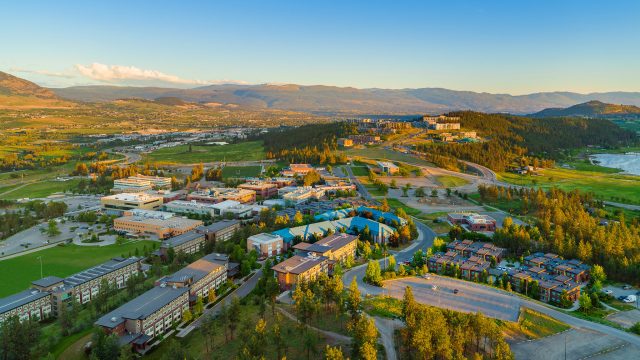Investigate biodiversity from ecological and evolutionary perspectives. Learn practical approaches and tools for conserving species and ecosystems. You’ll develop an understanding of core biology concepts and principles, and gain practical experience in the laboratory, field, and classroom, where you’ll develop computer and communication skills.
Why this program?
- Work closely with faculty members who supervise independent research.
- Participate in lab-based or field research at study sites in diverse forests, grasslands, lakes and rivers, and agroecosystems.
- Participate in projects ranging from quantifying biodiversity in soils, to modelling impacts of human activity on wildlife, to the foraging behaviour of wild predators.
- Join the local student chapter of The Wildlife Society to take advantage of increased networking, career development, and learning opportunities.
Program information
Send details- Campus: Okanagan
- Faculty: Irving K. Barber Faculty of Science
- Degree: Bachelor of Science
- Length 4 yrs
-
Co-op
Yes
You can combine your studies with full-time, paid work at top local and international organizations.
-
Honours
Yes
You can study intense specialization in a single field.
Ecology, evolution and conservation biology is an interdisciplinary field that draws on natural history, behavior, genetics, mathematical, and environmental sciences. It is a College of Applied Biology accredited program.
By studying ecology, you master the tools needed to understand natural systems and improve the impact human activity has on the natural world. Studying evolutionary biology provides a focus on the origin and maintenance of biodiversity, an understanding of the adaptive processes that explain reproductive tactics and animal behaviour and the tools required for investigating ongoing evolutionary processes in natural systems. Studying conservation biology gives you practical tools and approaches for protecting species and ecosystems.
In EECB undergraduate studies at UBC Okanagan, you can complete a Bachelor of Science (BSc) in ecology, evolution and conservation biology. The BSc program offers a major and honours in ecology, evolution and conservation biology.
Experiential learning and research
This program offers a wide variety of foundational and advanced courses that explore topics ranging from the fundamental processes underlying adaptive evolution, speciation, and extinction to techniques used by wildlife ecologists.
The Irving K. Barber Faculty of Science also supports student research through the Undergraduate Research Awards, which allow students to carry out their own projects under the supervision of world-class researchers over the summer months. There are also a number of other awards which provide opportunities for students to work with professors on their research.
You also have the opportunity to take your studies abroad with the Go Global program and the Exchange and Research Abroad program, or participate in original research – either your own or a professor’s in your field.
Campus features
UBC’s Okanagan campus is home to a number of world-class research facilities, including the Okanagan Institute for Biodiversity, Resilience and Ecosystem Services (BRAES). BRAES is a consortium of UBC faculty members and students, collaborators and partner organizations working together to advance research and teaching in conservation and ecology.
Life at UBC's Okanagan campus
UBC's Okanagan campus is renowned for its research opportunities and access to professors. On a tight-knit campus like the Okanagan’s, you’ll be able to work closely with award-winning faculty and make meaningful connections with your peers. You’ll also have access to clubs like the Biology Course Union.
Find out moreYour future
A UBC education will introduce you to people and ideas from around the world, open doors to new opportunities, and take you places you never imagined. You’ll graduate not only with expertise in your chosen field, but with the skills you need to continue growing, learning, and evolving with your career over time.
Program requirements
English-language requirements
English is the language of instruction at UBC. All prospective students must demonstrate English-language competency prior to admission. There are numerous ways to meet the English Language Admission Standard.
General admission requirements
IB Diploma Programme
- Completed IB Diploma, including at least three Higher Level courses.
IB Certificate Courses
- IB Certificate courses (Standard and Higher Level) may be used in an admissions average if you are graduating from a recognized high school curriculum that can be used as your basis of admission.
- IB Math Applications and Interpretations SL, or IB Math Studies, do not satisfy the math requirement for admission to UBC’s science-based programs, the Faculty of Management, the UBC Sauder School of Business, or the Vancouver School of Economics.
Degree-specific requirements: Science
- IB Math Analysis and Approaches SL or HL, or IB Math Applications and Interpretations HL (IB Math Applications and Interpretations SL, or IB Math Studies, are not acceptable)
- One of IB Biology, IB Chemistry, or IB Physics
- Grade 11 or equivalent Chemistry
- Grade 11 or equivalent Physics is strongly recommended
Note: Grade 11 Chemistry and Physics requirements listed are only relevant to students who are not completing the equivalent IB Diploma Chemistry and/or Physics courses.
For students studying outside of Canada, some examples of courses that may be accepted as Grade 11 equivalents are junior-level courses for American students, and IGCSE and O Level for those following British-patterned curricula.
Related courses
The following subject categories are particularly relevant for this degree. Consider taking courses in these areas in your junior year and senior year.
- Language Arts
- Mathematics and Computation
- Sciences
